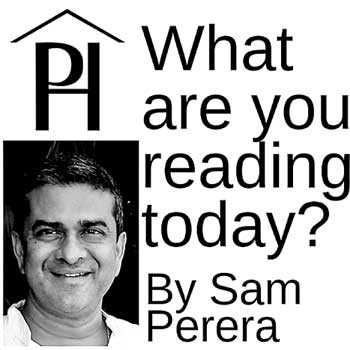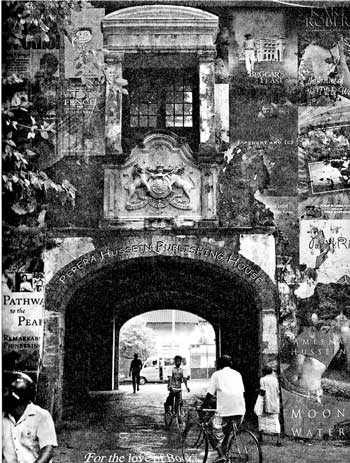Tuesday Mar 03, 2026
Tuesday Mar 03, 2026
Saturday, 5 January 2019 00:00 - - {{hitsCtrl.values.hits}}
 Whether you make an annual trek down to Galle for four days of high-brow entertainment or whether you vicariously follow visiting authors from the comfort of your armchair to update yourself with names you might not have encountered, the FGLF has inveigled a slot on people’s literary calendar.
Whether you make an annual trek down to Galle for four days of high-brow entertainment or whether you vicariously follow visiting authors from the comfort of your armchair to update yourself with names you might not have encountered, the FGLF has inveigled a slot on people’s literary calendar.
Apart from conversations with writers, the festival itself includes heritage walks, art walks, exhibitions, films and performances as well as more exclusive teas, lunches and dinners in intimate settings with participating authors. If you decide on going, in order to optimise your day-pass and get the maximum out of your visit, study the program well and attend some of the completely free events. To kick-start your journey, these are my favourite choices:
Sir David Hare
Sir David Hare gained a reputation as a playwright and also a film scriptwriter. For me, plays must be performed in order to be fully appreciated but given that we won’t be able to watch any of his plays in the foreseeable future, and in any event not before the FGLF, we can still appreciate his work by turning to film and watch a DVD of either Michael Cunningham’s The Hours which starred Merryl Streep and Nicole Kidman or even Bernhard Schlink’s The Reader starring Kate Winslet and Ralph Fiennes. Let him ignite your passion for theatre or simply sit-in and gain insights on how to turn a superb novel into a watchable play or movie.
Kamila Shamsie
The Pakistani-British writer Kamila Shamsie has written seven books in the past 20 years, all of which have received wide critical acclaim and all of which have been nominated for some sort of international award. In itself, that should encourage you to pick up one of her books now. Her latest novel Home Fire has been hailed as a masterful reimagining of Sophocles’s Antigone. Dragged into a contemporary setting, her characters behave true to original form and within the confines of the original story, Shamsie presents us with a largely credible novel (unfortunately, you can’t fast-track this one by downloading the movie).
 Akersloot
Akersloot
In 1640, Rajasingha 2 struck a deal with the VOC to rid Galle of the Portugese. Sailing from Indonesia under Westerwolt, Willem Jacobszoon Coster sacked the Portugese and returned Batticaloa to Kandy, but fiddled the contract by keeping Trincomalee and reneged on returning Galle – where he sat as Governor of Ceylon. A piqued Rajasingha allegedly had him despatched to nirvana. The governor’s residence Akersloot, named after Coster’s hometown means little-oak-forest-by-the-sea. From the British period onwards, this house was used by the Harbour Master and now belongs to the Ports Authority. Given its rare accessibility, seize the chance to sneak into these premises even if you have no interest in Nicolas Bouvier or a reading of his Le Poisson Scorpion – which incidentally, is also set in the Galle Fort.
Sarah Kabir
Unless truth and reconciliation are backed up by political will, lasting peace will remain a challenge. The first step in this process is gaining an understanding of who we and the ‘other’ really are. Voices Of Peace – They Were Just Like Us, is a non-cynical book which aims to promote the conversation of post-war reconciliation, nearly 10 years after the end of Sri Lanka’s ruthless civil war. In an attempt to show that there is very little human difference between our warring factions, Kabir presents stories from both sides of the conflict– 10 former LTTE cadres and 10 former Sri Lankan military personnel, interspersed with honest photographs by Munira Mutahir.
Madelein Thien
One of my favourite authors is the Lebanese-Canadian writer Rawi Hage. When I saw him at the Bali Literary Festival last year, I was compelled (uncharacteristically for me) to confess how much I liked his work. That alone is reason enough for me, to pick up Do Not Say We Have Nothing – his common law partner Madelein Thien’s latest novel. Thien herself is a literary powerhouse and like many Canadian immigrant or minority group authors who write about their original communities, her stories are often set in a largely Chinese or Indo-Chinese milieu. This novel will take you through Mao Tse-Tung and the cultural revolution onto the Tianneman square protests.
Given the range of visiting authors and their diverse talents, try to widen your world-view by listening in to the unfamiliar or something that for you would be relatively exotic. And whatever you choose, keep an open mind and mingle with like-minded people.
(Sam Perera is a partner of the Perera-Hussein Publishing House which publishes culturally relevant stories by emerging and established Lankan and regional authors – for a primarily Lankan audience. Ph books are available everywhere books are sold and through www.pererahussein.com)